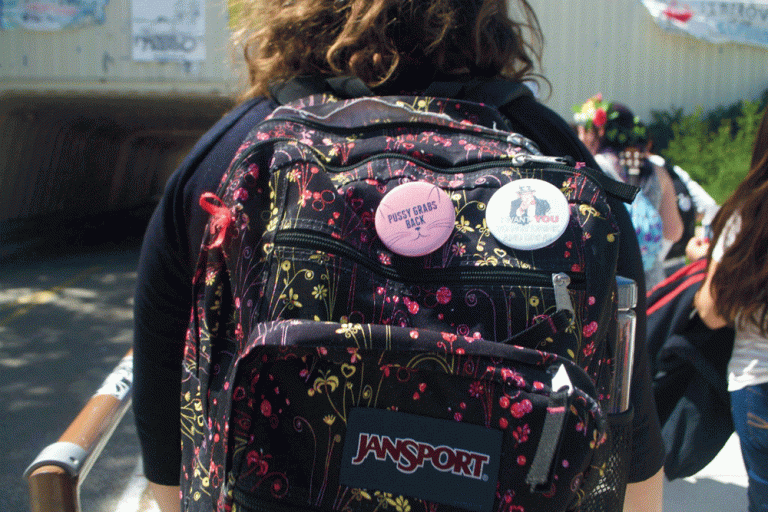
Lauren Marnel Shores
For Sexual Assault Awareness Month, UCSB’s Women’s Center and Womxn’s Commission teamed up with Take Back the Night for a Slut Walk against sexual injustice and victim blaming. Motivated UCSB students dressed in whichever outfits they felt most comfortable in, choosing to dress as revealing or modest as they preferred, as a reminder that one’s clothing is not an invitation to be violated.
Participants took up signs and marched through the streets of Isla Vista and UCSB’s campus, chorusing “claim our body, claim our right. Take a stand, take back the night,” and other chants against rape culture.
The march was mostly met with support, with some bystanders cheering as the group passed through campus. Luvia Solis, a second year history of public policy major, related how she hadn’t originally planned to be in the march but instead was passing through on her way to class when she made a detour and joined the group.
“Missing class is more important because recently in I.V., I was there firsthand when three of my friends were personally affected by this issue,” she said. “If I can get one person to see this march and not be a bystander, than I will feel fulfilled.”
Although the group was met with some laughter and a comment from an individual “following for a while, saying he was hoping to see some tits,” recounts third year arts and black studies double major Rose Houska, she still felt the march was a “very powerful group of people. Our voices were loud, regardless of numbers.”
“As long as there is a visible presence showing that this is something UCSB cares about, you know UCSB is there for them,” says third year political science major Mariam Tariq.
The event was led by Alicia Green, a biopsychology major and worker at the Women’s Center, as a way of protesting society’s “slut shaming and attempt to control women’s sexuality and their behavior” as well as “supporting victims of sexual assault so they understand it wasn’t their fault … and that they can be proud of their sexuality.”
She expressed what she perceived as a dismissive attitude from the university towards sexual assault victims. “The university should be better in how they address victims of sexual assault. It should command all of their attention and not just let it pass by … It’s like the victim has no support whatsoever.”
This opinion was echoed by Solis, who believes that the administration has the responsibility to “take accusations more seriously.” In addition, she felt that there needed to be more intervention done on the side of assaulters, placing more preventive precautions rather than wait until an assault had already occurred for action to be taken.
Current measures to help victims are located in the Women’s Center where CARE advocates support victims by providing rape kits and pregnancy tests as well as company so victims don’t have to be alone if they choose to file police reports. The purpose is to point individuals to “the right resources so they can receive substantial help,” says Green. “It’s all about giving them their options and making them feel in control because they once felt like they weren’t.’
She explained how she believed there were sufficient programs to help sexual assault victims, but that students “don’t fully understand where these resources are, and that they need to feel comfortable coming.” She described the hard work the student staff was putting in, but that she believed CARE and the hotline needed to be better staffed in order to provide more assistance.
Tariq explained that because “we’re understaffed when it comes to reporting rape, it takes months, even years, for the whole process. We need to offer resources which show that we are willing to put our money in order to support this cause.”
Despite UCSB’s party reputation, none of the interviewed participants felt that rape or sexual assault was a specific issue to UCSB, but rather pervasive in society as a whole. “We can be a party school without the rape culture,” says Solis.










